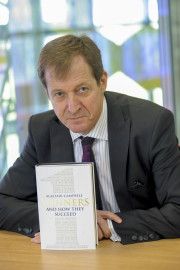Alastair Campbell was born in Keighley, Yorkshire in 1957, the son of a veterinarian. Having graduated from Cambridge University in modern languages, he went into journalism, principally with the Mirror Group. When Tony Blair became leader of the Labour Party, Campbell worked for him first as press secretary, then as official spokesman and director of communications and strategy from 1994 to 2003. He continued to act as an advisor to Mr Blair and the Labour Party, including the 2005 election campaign. Since then, he has been engaged mainly in writing, public speaking and working for Leukaemia Research, where he is chairman of fundraising.
Last month I had the opportunity to hear Alastair presenting his latest book first at the FCC of Hong Kong and soon after at one of the bookshops of the Bookazine chain, in Prince Building, Central.
What he was presenting was his: ‘Winners and how they succeed’ Hutchinson, 2015.
At Bookazine, Alastair gave a short speech presenting his book and why he wrote it. It consists of interviews he gave to so called ‘winners’ in several areas: business, politics and sport. Putin, Mandela, Angela Merkel, Nerendra Modi, Jose Mourinho, Garry Kasparov and so on. It is his conviction that the world is firmly divided in winners and losers and that the winners are so just because they have a strategy and a drive not to be losers. Then he took several questions from the floor even if, unfortunately, this part was somehow spoiled by a tattooed Australian (they seem to be everywhere nowadays) who raised questions unrelated to writing, to the book and even to Campbell himself. But patiently the author tried his best to answer.
It was clear to me that even when he speaks of sport – he is a great football fan – you could notice that he is always veering towards world politics, which, I dare say, remains the main driving passions of his life.
Perhaps it is true that when you have been close to the pinnacle of world power it is difficult to leave everything behind and retire in a monk’s cell. The great sage Confucius, in praising Hui, his best disciple, told him: “When called, we step forward, when cast aside we withdraw. Only me and you are capable of that.” Yes, I agree, it is not easy.
I read his book in the following days and I do like it. It is light, well written and laid out in the “American way” so to speak, no shadows and little doubts, flowing smoothly from the beginning to the end with inserted windows in the text highlighting sentences which are of some importance.
Alastair analyses how potential winners deal with unexpected setbacks and new challenges and judges what the different worlds of politics, business and sport can learn from one another. Then he sets out a blueprint for winning that we can all follow.
This book is selling well – which is extremely important for every author – even if Alastair remains a divisive figure in society, calling for hate from some and love from others.
It will then come to no surprise that some columnists in the British press have mercilessly thrashed him – even on a personal level, doubting openly about his personal integrity – as well as the quality of his writing.
Here is Nigel Farnadale on the Telegraph:
http://www.telegraph.co.uk/culture/books/bookreviews/11451632/Winners-and-How-They-Succeed-by-Alastair-Campbell-review.html
And here an insulting John Carce on the Guardian:
http://www.theguardian.com/books/2015/mar/01/winners-how-they-succeed-alastair-campbell-digested-read
Last a more positive view on the Irish Times by Patrick Freyne:
http://www.irishtimes.com/life-and-style/people/alastair-campbell-walking-with-winners-1.2145586
But I don’t mind. I met Alastair and having talked to him I received the impression that he is a real winner in the real world of history-making. Yes, I do wish him well.

